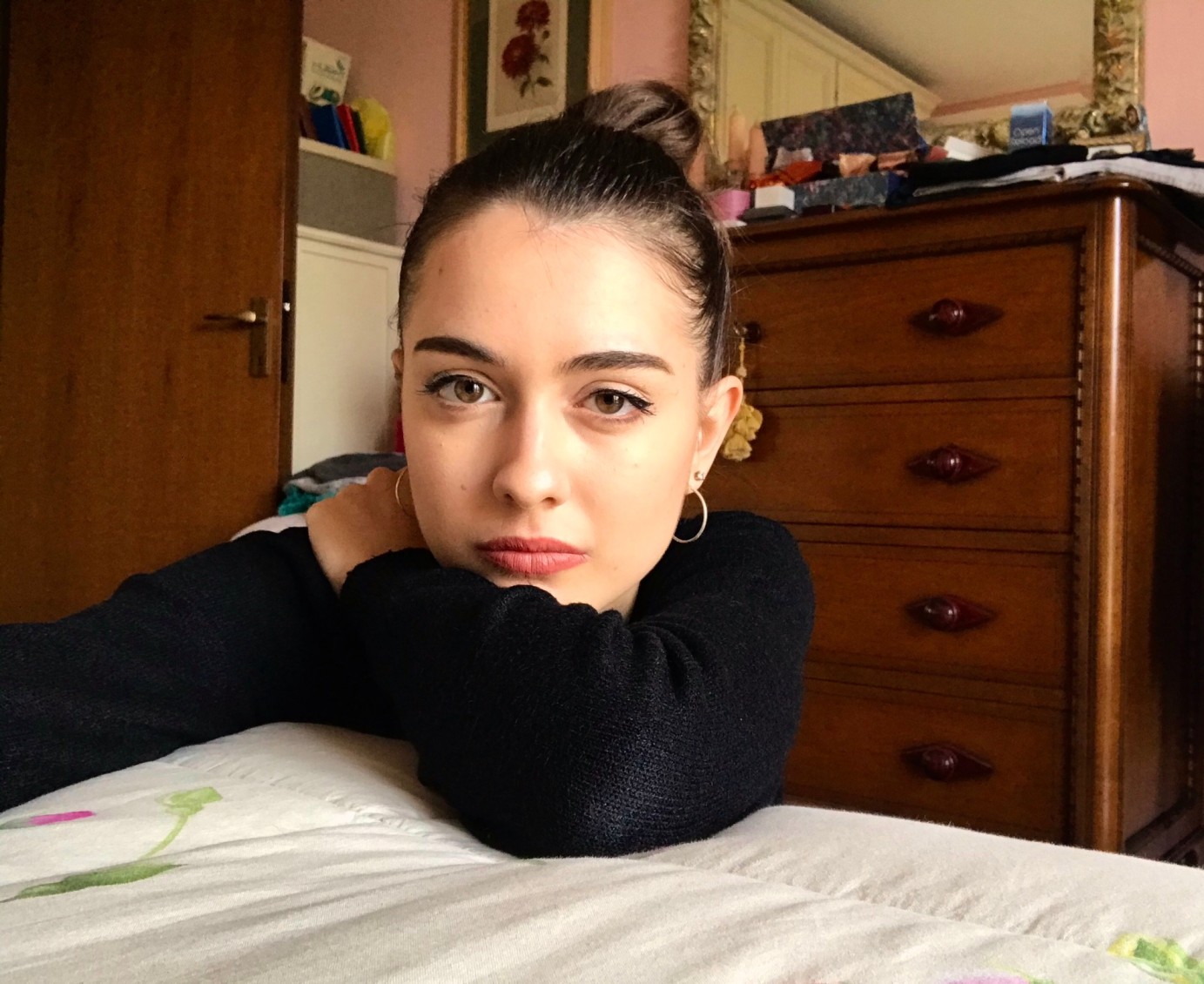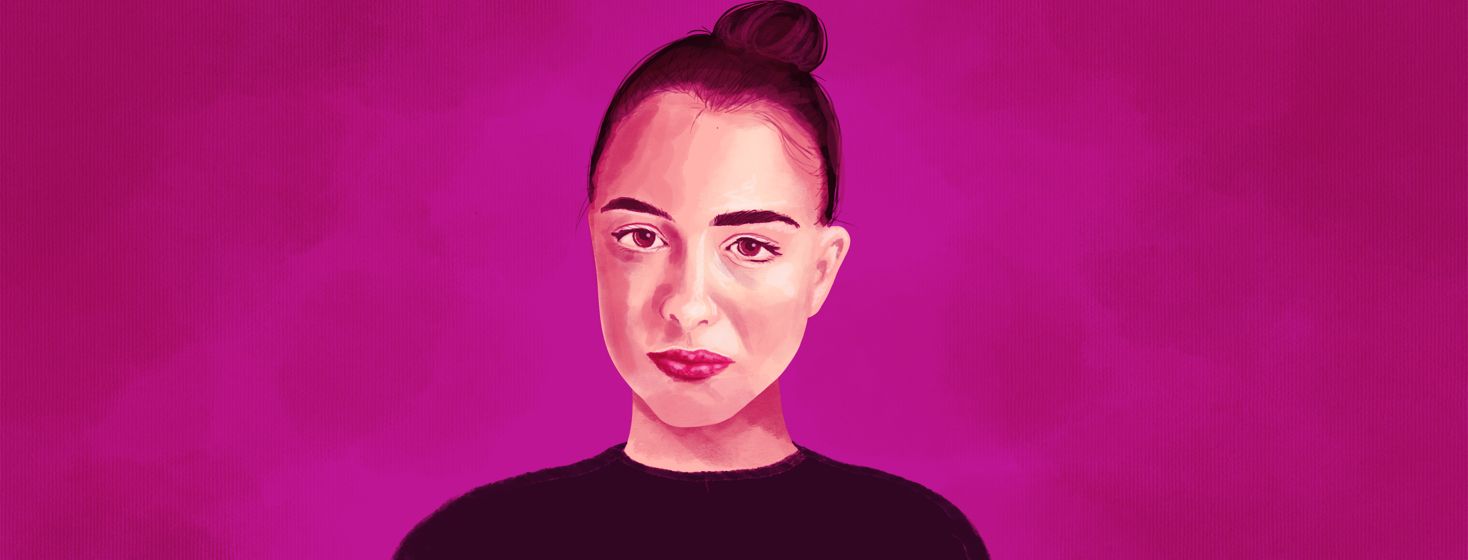Valeria's Atopic Dermatitis Story
The Editorial Team at AtopicDermatitis.net is highlighting people in the eczema community and their healing journeys in a series of Instagram Interviews. We talked to Valeria (@dermatiteatopicdiary) about growing up with eczema, eye problems, makeup and more.

Valeria's atopic dermatitis story
I have dealt with eczema/atopic dermatitis since I was 3 months old. The first symptoms were: redness around my eyes, extremely dry skin, cuts behind my ears and on the lobes, and restlessness. I immediately received a diagnosis of eczema in an aggressive form. There aren't other cases in my family; none of my siblings are dealing with eczema. My pediatrician advised to use moisturizer and in extreme cases, steroids. My parents refused to give me steroids.
My flares were spreading
At around 3 years old, my eczema became out of control. It still was in the old places, but also it expanded around my mouth, on my wrists and hands, on my forearms, and in the back of my knees. At the time, we didn't have a medical line to follow. I changed a lot of moisturizers and doctors, I had to go to the ER because with open cuts there is always a high risk of staphylococcus infection.
Homeopathy and a dairy free diet
At 6/7 years old I tried homeopathy, after an exam called "tricotest" (an exam where you get your hair analyzed and you try to get as much information about the body health as you can) the doctor decided that the best thing for me was to combine homeopathy therapy with a dairy-free diet. I have followed a dairy-free diet for 4 and a half years. It didn't give me any results. At the same time, it was necessary to use moisturizer because my skin was really dry. After a shower, or after every contact with water, I had to apply the moisturizer immediately, for example.
Tests, tests, and more tests
I started to take a regular asthma test (every year), food allergy test (every year) and test for celiac disease. Around 9/10 years old, I got an allergic rhinitis diagnosis and I started to combine the daily use of a moisturizer with the daily use of eye drops. I started to notice a cyclicality in my eczema: it was better in summer and then worst again in winter, sea water seemed help my cuts.
My eczema kept getting worse
Doctors always told me that around 12/13 years old, 90% of the patients start to get better. Around 12/13 years old, in my case, I got worse. My face was full of cuts, erythema, scars and excoriations. My forearms were in the same situation as my face, and so were my knees and my neck. Nothing seemed to work.
The beginning of steroids
At 14, I started with steroids. My doctor prescribed me betamethasone disodium phosphate, class 1 steroid tablets, steroid eye drops, and a steroid balm. At the beginning, it seemed great because my skin was looking better, but shortly after, I began to see the collateral effects. I started to swell, my hair fell out more than normal, I felt beyond tired all day every day, my eyes were completely photosensitive, and my stomach hurt every day all day.
Topical steroid withdrawal and mental addiction
Around 16/17, I decided to stop with steroids. My eczema came back even stronger and it seemed that the situation was worse than before. I dealt not only with topical steroid withdrawal (TSW), but also with a "mental addiction." Steroids seemed able to give me the skin that I wanted, they seemed necessary to me to look pretty.
Homeopathy and heliotherapy
I decided to start homeopathy, this time combined with heliotherapy. The idea behind the treatment was to purify my body from all the toxins in my body accumulated over the years by steroids and medicines. It didn't work, but around 19/20 years old, my skin started to look better.
Learning about my skin allergies
At 23 years old, I did a test called "patch test" and the result was that I have an high reactivity to nickel, that can be found not only in jewelry, but also food, and latex. I started a phototherapy course.
A contact dermatitis diagnosis
At 25 years old, I received a diagnosis of what in Italian is called "dermatite da contatto," literal translation is "dermatitis by touch." It means that I don't just have eczema, but also this other type of dermatitis, that looks like eczema, but the triggers are different. In fact, dermatitis by touch is the reaction from getting in touch with substances that my body rejects.
From when I was 5 years old to today, I do a spa treatment for 1-2 weeks, with water that is specific to skin problems thanks to the unique formulation.
An emotional burden during adulthood
The hardest part to deal with is the emotional one. Living with the itch and cuts is not easy. Being an adult with eczema is hard because you feel lonely in the journey. All the different doctors I have talked with always told me that an adult with eczema is the minority of the minority. This is one of the reasons I started my Instagram account because I would like to find people, who are also adults with eczema. Even with support from my parents and friends, it's easy to feel alone. As much as they try, they can't help you, you can't ask for advice or something like that.
Moisturizer and a flexible routine
Right now, what is really helping me is using moisturizer. I use it every hour even if I don't feel the itch. The night is the worst moment. Sleep is hard with the itch and it is almost impossible to sleep an entire night with dry skin. I can't use or touch water without using a moisturizer immediately after, I can't even bite fruit because the juice full of water would inflame my lips. I don't have a skincare routine because I think that the key with eczema is being resilient. Eczema can change in a night. It could be great the evening and the day after your skin is a mess, so what really helps you through this is being able to change your strategy with eczema. If my skin looks good, for example, I use some products, but if I see that it starts to get worse, I change products and routines.
I'm trying to follow a heathy diet, I try to avoid pre-cooked or treat foods, the best thing is to take the raw material and work with that.
My recent eye problems
Editorial Team: How has eczema impacted your eyes? What eye symptoms have you been experiencing and how have you been managing them?
Valeria: In September, I went through a huge eczema crisis that started from my eyes. I found out that I have a clinical condition, actually really common in people dealing with atopic dermatitis that is called (literally translation from Italian) "Roman pavement." It means that, the inner surface of your eyelid is not smooth and regular, but actually is a spot where eczema can came out. During a crisis the surface can became thick, causing pain every time you open/close your eyes during these flare-ups. It can damage your cornea.
This is what happened to me. I got an eyelid edema and I damaged the cornea and it caused a temporary visual defect; the good thing is that the cornea regenerates itself, so the defect is temporary.
How does makeup help?
Editorial Team: You've shared some posts about the fear of showing your face without makeup. How has sharing to Instagram helped you overcome this fear? Any advice for someone who is self-conscious about going make-up free?
Valeria:Makeup has helped me a lot, especially during my teenage years, it was like my security blanket. I have had a hard time accepting atopic dermatitis and dealing with the idea that I have to live with a chronic illness. Makeup helped and still helps me during the bad days because at least I can cover it and it gives me confidence when I'm surrounded by strangers.
Finding a "safe place" on Instagram
Instagram helps me because I have the chance to show this part of my life in a "safe place." There is a community made by people that are dealing with your same problems and they can support and understand you. It's easier to expose myself on my Instagram account than to do it in real life, because there is a lot of ignorance about atopic dermatitis and it is common to be forced to deal with rude comments or questions.
Learning how to be resilient
Editorial Team: Anything else you'd like to add?
Valeria: I think that the key to dealing with eczema is learning how to be resilient, being able to enjoy every day of your life despite your skin's appearance. It's not easy, but I deeply believe that we can't wait to see our skin healed to start to be happy. It's also important to learn to express our feelings, especially the bad ones; it can seem stupid, but the connection between skin and emotions is deep and it is not strange to see new flare-ups during a bad emotional period.
Follow Valeria’s healing journey on Instagram at @dermatiteatopicdiary!
What other conditions do you have with your eczema?

Join the conversation